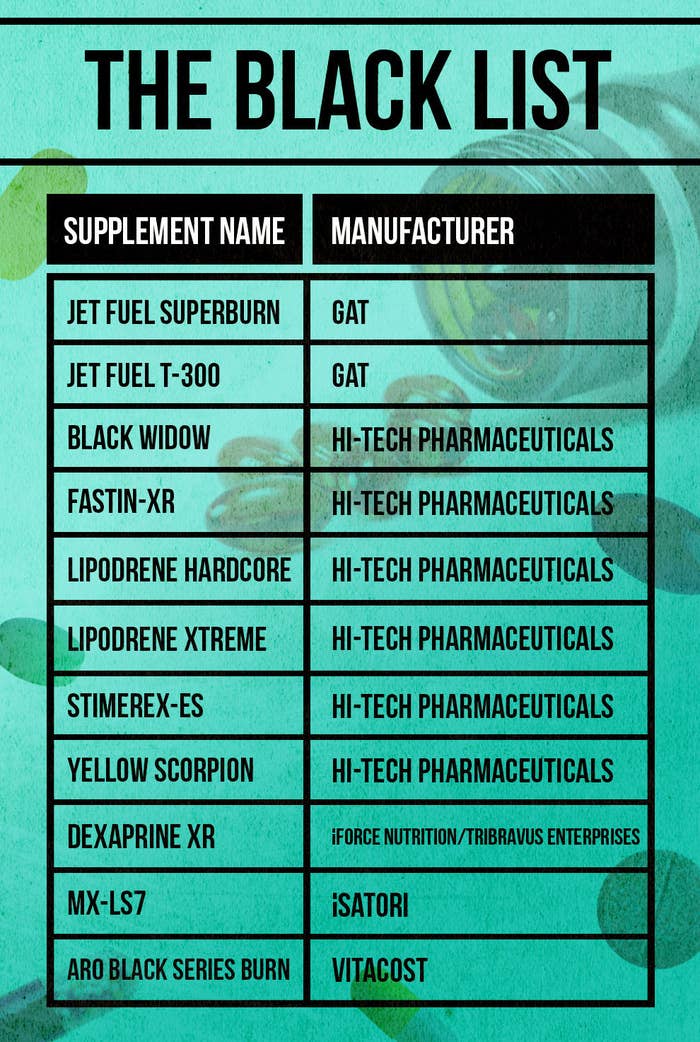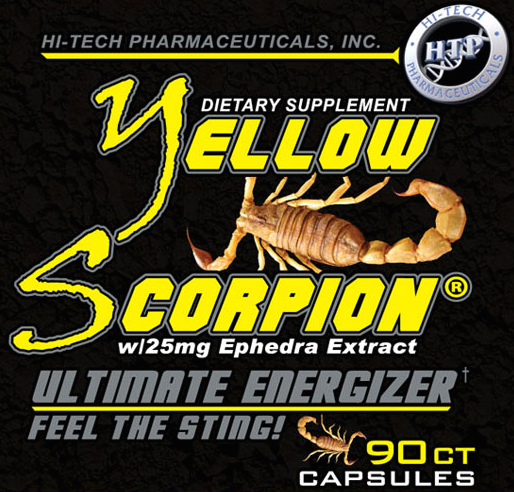
Eleven supposedly "all-natural" weight-loss supplements contain BMPEA, a close chemical cousin to amphetamine, finds a study published Tuesday.
The products all list Acacia rigidula, a Texas shrub also known as blackbrush, on their labels. They're sold widely online and in stores. In response to the study, one of the manufacturers, Vitacost, and a large distributor, the Vitamin Shoppe, have stopped selling the products.
The new findings align with a 2013 study carried out by scientists from the FDA showing that many products listing Acacia rigidula on their labels also contain BMPEA. That study also found that real Acacia rigidula leaves, twigs, and bark do not contain any trace of BMPEA.
No one knows the effects of BMPEA on human health. Its chemical structure is very similar to amphetamine, a stimulant known to increase blood pressure and heart rate. Despite these concerning findings, the FDA study did not name the tainted supplements or their manufacturers, and the agency didn't issue any public warning about products labeled with Acacia rigidula.
"The fact that they haven't done anything two years after their own research team sorted this out is completely inexplicable," Pieter Cohen, a doctor at the Cambridge Health Alliance in Boston and one of the new study's authors, told BuzzFeed News.
"It just demonstrates how the FDA is abdicating their responsibility to protect the public's health," Cohen added.
When asked by BuzzFeed News why it had not named the companies selling BMPEA or notified the public about the products, FDA spokesperson Juli Putnam said that its 2013 study "was intended as investigative research into Acacia rigidula and dietary supplements containing this botanical in general, rather than as a signal of pending enforcement activity."
In a brief statement about Cohen's new study, Putnam said that the FDA "does not identify a specific safety concern at this time," but that it "will consider taking regulatory action, as appropriate, to protect consumers."

Unlike prescription drugs, supplements don't need FDA approval before going to market.
They're only supposed to contain vitamins, minerals, herbs, and botanicals. When the FDA discovers otherwise, federal law says it "is responsible for taking action against" tainted products.
In 2013, for example, the FDA stormed the Georgia warehouse of the supplement company Hi-Tech Pharmaceuticals. U.S. marshals seized 1,200 pounds — a retail value of $2 million — of products spiked with DMAA, a synthetic stimulant linked to psychiatric disorders, heart attacks, and death.
Hi-Tech then sued the FDA, claiming that DMAA comes from a geranium plant. In a press release about the suit, Hi-Tech claimed to have sold more than a million bottles of DMAA products. The lawsuit is still pending.
Last year the Federal Trade Commission won a long-running court case against Hi-Tech for a different issue: making misleading health claims when advertising its products. The court found against Hi-Tech, but the company's two leaders refused to recall the suspect products, landing them in jail for contempt.
Despite these high-profile scuffles with federal agencies, many of these same brands are still being sold. In fact, of the 11 supplements called out in Cohen's new study as containing BMPEA, six are made by Hi-Tech — and all six are brands that the FDA had previously blacklisted for having DMAA.
"It's certainly possible that some of the supplements we tested still have DMAA in them," Cohen said. "We're currently in the process of analyzing them for all compounds."

Chemists first synthesized BMPEA in the early 1930s, and subsequent studies found it had stimulant effects in cats and dogs.
The FDA's 2013 study was the first to report BMPEA in dietary supplements. Last year scientists working for the Dutch government found the stimulant in Dexaprine, a supplement made by iForce Nutrition in Vista, California. Complaints to the Dutch Poisons Information Center suggested that nausea, agitation, and cardiac arrest could come from just half a tablet of Dexaprine.
The Dutch scientists were "not really surprised" to find it contained BMPEA, Bastiaan Venhuis, senior scientific officer at the Netherlands' National Institute for Public Health and the Environment, told BuzzFeed News by email. His team often refers to studies of stimulants from the 1930s and '40s to figure out what today's supplements may be spiked with, he added. "We have a pretty long list of what might come next."
BuzzFeed News reached out Monday to the five companies that Cohen's study called out for making products containing BMPEA. Vitacost, maker of Aro Black Series Burn, said it will no longer sell that product, nor five others containing Acacia rigidula, on its website.
"While the FDA has not declared the fat-burning ingredient BMPEA to be harmful, we take safety concerns very seriously," Kathleen Reed, Vitacost's director of financial planning and analysis, told BuzzFeed News by email.
GAT, which produces Jet Fuel Superburn and Jet Fuel T-300, declined to comment. iForce Nutrition, which makes Dexaprine XR, and iSatori, maker of MX-LS7, did not respond to requests for comment.
Jared Wheat, president of Hi-Tech Pharmaceuticals, confirmed that its Acacia rigidula products contain BMPEA, but contests that it is a synthetic compound. "Every lot should contain BMPEA as it is a naturally occurring alkaloid," he told BuzzFeed News by email, citing a 1998 study finding amphetamines in the shrub. (The 2013 study by FDA scientists scrutinized this study's methods and noted that amphetamine is a "man-made compound.")
Hi-Tech Pharmaceuticals has sold more than a billion doses of Acacia rigidula since 2003, Wheat added. The company has conducted three clinical studies on the effects of Acacia rigidula, Wheat said, and none have found any adverse events, "other than possibly a jitter or shake which is common amongst stimulants."
Last week, Hi-Tech issued a press release trumpeting how its proprietary Acacia rigidula extract boosts metabolism:
"With FDA's harsh stance on DMAA-containing supplements, the sale of dietary supplements containing Thermo-Rx® brand Acacia Rigidula Extract has increased dramatically," the release states.
It also says that Hi-Tech is providing the Acacia extract to other companies: "Hi-Tech has worked diligently over the past 2 years to ramp up raw material production as we continue to get major brands wanting to include this one-of-a-kind weight loss ingredient in their formulas."
Three of those major brands — Dexaprine XR, Jet Fuel Superburn, and Jet Fuel T-300 — were also implicated in Cohen's study as containing BMPEA.
"Could one company be behind the majority of what we're seeing here?" Cohen said. If so, "that would have made the FDA's job even easier."
Last Thursday, 14 state attorneys general asked Congress to launch an investigation of the supplements industry.
They also asked lawmakers "to consider a more robust oversight role" for the FDA.
Daniel Vigil, a sports medicine doctor at the University of California, Los Angeles, says that the FDA doesn't seem to have the resources to identify harmful supplements.
"These things are out there and the FDA just doesn't have the resources to seek them out, evaluate them, and police them," Vigil told BuzzFeed News.
As a doctor for several of the university's varsity teams, Vigil sees many athletes who take herbal supplements to try to get a competitive edge. Given the products' wide availability, all he can do is try to educate his patients about what they're getting into, he said.
"The fact that supplements can have virtually anything in them without a whole lot of oversight means that you really do take your chances regarding what you put in your system," Vigil said.
"The adage of 'buyer beware' has never been more important."
This story has been updated with the Vitamin Shoppe's announcement that it will no longer sell Acacia rigidula supplements.
